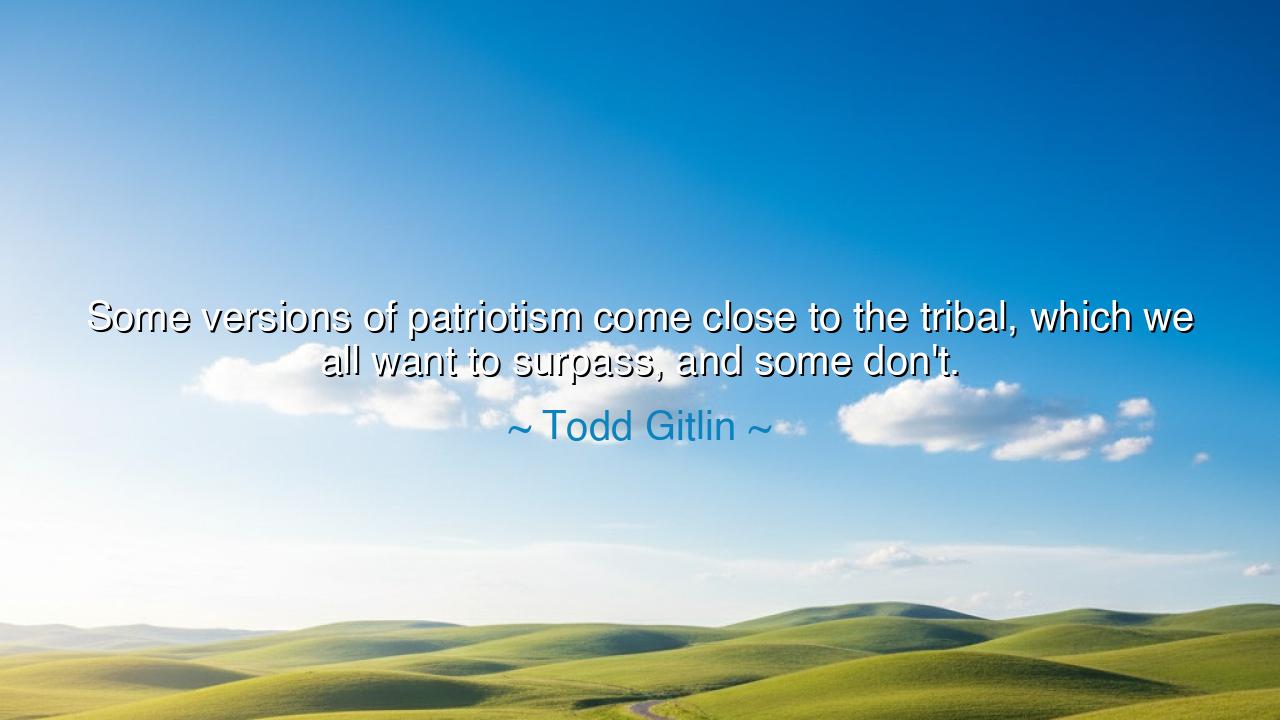
Some versions of patriotism come close to the tribal, which we
Some versions of patriotism come close to the tribal, which we all want to surpass, and some don't.






The scholar and commentator Todd Gitlin once reflected with piercing insight: “Some versions of patriotism come close to the tribal, which we all want to surpass, and some don't.” In these words lies a meditation on the dual nature of patriotism: it can bind communities in noble unity, or it can descend into a narrow, exclusionary loyalty that mirrors the instincts of the tribe rather than the reasoned conscience of the citizen. Gitlin urges us to discern the difference, to cultivate a patriotism that uplifts rather than confines, that builds a nation through principle rather than fear or hostility.
In the eyes of the ancients, the virtue of patriotism was inseparable from justice, courage, and wisdom. The city-state of Athens, for example, praised citizens who served the polis with valor and integrity, yet thinkers like Socrates warned that blind allegiance, unexamined and unreflective, could become a form of slavery to the passions of the many. Gitlin’s reflection echoes this timeless lesson: a loyalty rooted in fear, exclusion, or tribalism is not true patriotism, but a shadow of it—a force that binds by instinct rather than moral reason.
History provides vivid illustrations. Consider the rise of nationalistic fervor in 19th-century Europe, where patriotism sometimes merged with xenophobia and ethnic chauvinism. While devotion to one’s nation inspired the pursuit of unity and independence, it often tipped into exclusionary practices that demonized neighbors and justified conquest. Gitlin reminds us that patriotism has the potential to either elevate or degrade the human spirit, depending on whether it is guided by universal principles or narrow tribal instincts.
By contrast, examples of enlightened patriotism illuminate the path forward. The founders of the United States, despite their conflicts and imperfections, sought to establish a nation where allegiance was tied not solely to ethnicity or birth, but to shared ideals of liberty, justice, and civic responsibility. Their patriotism transcended tribalism because it demanded loyalty to principles greater than immediate self-interest or insular identity. Gitlin’s insight calls modern citizens to nurture this form of moral allegiance, one that builds bridges rather than walls.
The meaning of this quote is also personal and moral. Tribal patriotism asks us to see others as outsiders, to defend symbols or rituals blindly, and to equate disagreement with betrayal. True patriotism, by contrast, encourages reflection, moral courage, and the inclusion of all citizens in the common good. It is neither passive nor blind; it is active, conscious, and principled. Gitlin’s warning is that we must always examine the patriotism we practice and endorse, asking whether it unites humanity or divides it.
Consider the story of Rosa Parks, whose quiet defiance in Montgomery challenged systemic injustice in her nation. Her patriotism was not expressed through blind loyalty to laws or social norms, but through devotion to the higher principles upon which her country was founded. She exemplified the form of patriotism Gitlin praises: one that transcends tribal instinct and seeks the moral elevation of the nation, even when it demands personal sacrifice.
The lesson for all generations is clear: do not confuse loyalty with tribalism, and do not mistake exclusionary zeal for virtue. Patriotism that mirrors the tribe constricts the spirit; patriotism that embraces justice, courage, and principle uplifts the nation. The quality of our allegiance is measured not by how fiercely we defend symbols, but by how faithfully we uphold the ideals that give those symbols meaning.
Practically, this calls each citizen to cultivate critical thought, empathy, and moral courage. Question rhetoric that divides, support policies that include rather than exclude, and act in ways that honor the shared values of your community. Celebrate your nation’s strengths while confronting its flaws, and nurture a patriotism that is principled, reflective, and transcendent. In doing so, one follows Gitlin’s guidance: love of country should rise above the narrow instincts of the tribe, elevating both nation and citizen to their highest potential.






AAdministratorAdministrator
Welcome, honored guests. Please leave a comment, we will respond soon